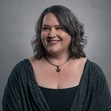Amy Rivers's Blog, page 5
August 26, 2018
#WhatsYourStory Featuring Erick Mertz
 Erick Mertz is a fiction author from Portland, Oregon. Published by Longbranch Productions, the forthcoming novella, The Mask Of Tomorrow is his debut work of book length fiction, and the first in The Strange Air Series of Oregon based supernatural mysteries. Prior to this book’s release, his fiction has been published in Goldman Review, The Los Angeles Review and The Bethany Reader.
Erick Mertz is a fiction author from Portland, Oregon. Published by Longbranch Productions, the forthcoming novella, The Mask Of Tomorrow is his debut work of book length fiction, and the first in The Strange Air Series of Oregon based supernatural mysteries. Prior to this book’s release, his fiction has been published in Goldman Review, The Los Angeles Review and The Bethany Reader.In 2014, he self-produced The Measurable Blood audiobook, based on a short story of the same name, published in Mad Scientist Journal. His poetry can be found in Turtle Island Quarterly, Stone Boat, Dos Passos Review, Cirque Magazine, and most recently, Baldhip Magzine.
In a previous life while an English student at The University of Oregon, he was a late night DJ at 88.1 KWVA. Currently, he writes about new music at New Noise, Pennyblack Music and Bearded UK. He has written articles on Oregon history for 1859 Magazine, Coastal Living and Southern Oregon Magazine.
A baseball fanatic, beer and food enthusiast, and unapologetic music obsessive, Erick not only considers the Pacific Northwest his home, but also his perpetual muse. When he is not writing, he also works with community-based people with Developmental Disabilities, a field where he has worked since high school.
Currently, Erick lives in Portland with his wife and son. Like an old house where no wall is straight and no corner is exactly square, my writing career has been a constant search for structural integrity.
I was always a writer. I used to wonder with gravelly suspicion about people who weren’t pre-occupied with words and sentences, and the challenge of penning a novel.
My father was an office man. He was a mechanical engineer to be exact. He was responsible for designing massive industrial conveyor systems all over, from Seward, Alaska to Tasmania. In his world, every corner had to be perfectly square, measured lines even, plans produced in triplicate. One of my first jobs was to run prints for him and I can still see his perfect engineer’s handwriting.
Even today, some thirty-five years later, I recall the phone number to his office. On certain days after school I would call him at work before he left. I would ask about his day, but my real purpose was to request some of the notepads and pens his employer kept hoarded in the supply closet. For me, that closet was like a candy store; the spiral bound notebooks delightful places for new writing.
We lived on a country road, connected to another country road, which led to another country road that ran along a fruit orchard. There was a cherry tree atop a small hill. The shadow of that cherry tree was the outside boundary of how far, at seven years old, I was allowed to walk by myself.
Every day after school, rain or shine, I would walk out to the cherry tree where my Dad could pick me up on his way home. I could pick out his headlights from the bend in the road more than a half-mile up. Those days when I requested notepads and pens were especially exciting. I would hop into his old Ford F-150, slide up onto the bench seat where he’d have a stack of them waiting for me. He never forgot.
“Write a good one, OK?” he would say before taking us that last mile back to the house.
Once completed, my Mom would sew construction paper covers onto my books. We treated the whole process like a cottage publishing enterprise: over breakfast, I would discuss cover design, afterward we would carefully select thread and I would oversee the binding before we presented the finished product on the table like a bookstore.
Looking back my parents were a supportive pair. I’m sure they looked at that collection of silly space opera pastiches and wondered what it would all add up to.
Dad said, “write a good one” and Mom served as my publisher. Still, I wonder what they thought of the road I was setting out on.
No one tells you how to do this, other than to usually say, don’t do something like that. It’s an impractical thing, writing, perhaps the most impractical thing of all. Even without a map to where I was going, I would not be deterred though. Writing was always the thing I was going to do, one way or another. Besides, all of the more practical careers like astronaut, baseball player and President were already taken.
So, I stocked up on spiral notebook pads and pens, and began the life’s work.
As I got older, my Dad began his process of parenting my aphorism. One of his favorites was, “be careful about making too many plans” which was odd for an engineer whose life output was a roll of blue printed plans.
More genuinely though, Dad would add, “all you’ll end up at the end of the day is a person biding their time.”
He was right. The longer you sit around in the “what” and “when” the more infirm your self-definition becomes. If you just do this thing, whether that thing is a book or an article or a blog, you become the action and not the plan.
Be the verb, right? That’s what he was saying. Be the action word.
Four years ago, I met Tom Robbins at a writer’s conference. He was alone at a banquet table, waiting impatiently for someone to bring him his dinner.
My fellow writers were afraid to walk up to Tom. Having already infused myself with some liquid courage, I had no such inhibitions.
“You’re Tom Robbins,” I said.
Feigning surprise, he replied, “I am.”
“Your writing has cost me a girlfriend or two,” I said.
Then he laughed. I mean, really laughed. “Hey, me too.”
I noticed that Tom was wearing an audacious pair of Converse All-Stars. They were covered in murals of Andy Warhol’s Marilyn Monroe.
“Nice shoes,” he said.
“That’s the secret,” he replied.
“Shoes?”
Then Tom Robbins shook his head with sage disgust. “No, kid. Be memorable.”
~
My first self-published book, The Mask Of Tomorrow will hit the ground later this fall. Sadly, my Dad won’t be there to see it. I’ll send Tom Robbins a copy, but what are the odds he reads it?
If my Dad was here though, I would tell him that him proudly that I’m publishing it myself, and that I wrote the first draft in pen in a spiral notebooks. I don’t know if he’d fully understand. But I at least believe he’d recognize where all of this came from.
A lack of square corners. Wobbly walls. Years in, it hardly seems to make a difference. The strange road is home.
Be yourself. Be memorable.
The Mask of Tomorrow Way out in Canyon County, Oregon the shadows seem to cast just a little longer. Maybe it’s because of the way the sunrises over Tallow Creek. Maybe it’s how shafts of summer dusk light spill out from behind the jagged peaks of the Cascade Mountains.
Or maybe it’s something deeper still, something buried long ago out in the sage grass that is only now simmering to the surface.
What took place in the early-1980’s around the burned out mill town of Josephine is one of countless untold chapters in the story of the American west. It is but a tiny, haunted sliver of a larger saga that began long before any one living there now can remember.
Taking place in a world teeming with glassy eyed drifters, stoic ranchers, heavy-pouring bartenders, and a few honest cops, The Strange Air Series of supernatural mysteries explores the unfurling of a long held cosmic secrets that threaten the rusted out husk of the American dream.
The debut book in the series, The Mask Of Tomorrow will be published in Autumn 2018. Subscribe at www.erickmertzauthor.com for updates on it’s release.
Facebook:
@erickmertzauthor
Twitter:
@emerzwriting
Published on August 26, 2018 23:00
August 20, 2018
#What'sYourStory Featuring Bert Edens
 Bert Edens has been making up stories since he was old enough to talk, a habit which tended to get his hind-end tanned and his nose stuck in a corner. Along the way, he decided to start writing some of them down. His youth was filled with imaginative creations of everything from sci-fi epics to send-ups of the “Friday the 13th” series. His first print credit was a story about his older son, Zak, published in the 2001 anthology “Living Miracles: Stories of Hope from Parents of Premature Children”. Life then got in the way, so to speak, as he focused on raising his two sons and becoming a widower, the latter not by choice, of course. He has recently had two flash fiction pieces published in anthologies, had a non-fiction piece published in a magazine for disability awareness, and has multiple stories accepted for publication with countless others submitted and looking for homes.
Bert Edens has been making up stories since he was old enough to talk, a habit which tended to get his hind-end tanned and his nose stuck in a corner. Along the way, he decided to start writing some of them down. His youth was filled with imaginative creations of everything from sci-fi epics to send-ups of the “Friday the 13th” series. His first print credit was a story about his older son, Zak, published in the 2001 anthology “Living Miracles: Stories of Hope from Parents of Premature Children”. Life then got in the way, so to speak, as he focused on raising his two sons and becoming a widower, the latter not by choice, of course. He has recently had two flash fiction pieces published in anthologies, had a non-fiction piece published in a magazine for disability awareness, and has multiple stories accepted for publication with countless others submitted and looking for homes. Bert lives in Arkansas with his amazing wife, Carrie, whom he married in June 2018, and older son Zak, with his younger son Josh living nearby. Besides being a writer and editor, Bert spends his spare time teaching martial arts, working security, and doing application development and customer support for an Arkansas-based technology company.
You can read all you want about Bert at his website www.bert-edens.com. Pain. The best stories come from pain.
We all love a happy ending full of hugs, kisses, rainbows, and riding off into the proverbial sunset, but the most powerful, visceral reactions readers experience come from stories that set their hearts, minds, and souls on end. Flip-flop their expectations of how things should be and give them sinister glances into how things could be, and you will hold their attention.
There is some semblance of schadenfreude in reading about other people’s suffering. You can lose yourself in the story, feel the pain and heartache, and cry along with them. Yet, when it’s all done, you can just close the book and be done with it. You can revel in that fact that, whew at least that wasn’t you.
While I write and have been published in many genres, dark fiction always seems to be where the stories flow like a river as I’m putting them to paper. People who know me but are just learning I’m a writer are often surprised by this, because I tend to be the epitome of an eternal optimist. I have a ready smile and word of encouragement that is genuine because I truly want everyone to be happy, even those who have harmed me or those I love. I can’t wish ill will on anyone because I’ve been there and felt those barbs.
I write about children being abused, be it physically, emotionally, or sexually, not because I espouse that kind of cruelty, but because I know what it’s like. My childhood was full of countless challenges that affected me well into my first marriage because I honestly had no idea what a healthy relationship looked like. I struggled, we struggled, and I grew while Jann had the patience of Job waiting for me to start acting like an adult, husband, and father.
Broken adults come from broken children. Broken adults make the best artists, both before and after they have been reassembled, the cracks and flaws filled with mortar. But those scars are still visible, often glowing and pulsing and bleeding, and they are my Muse.
I write about death not because I enjoy it, but because I have known potential and real loss. I have sat in a chapel outside the NICU as doctors stopped and restarted Zak’s heart, hoping to reset a potentially fatal arrythmia. Jann and I held each other close knowing there was a chance, however slight, his heart would not restart. We had already almost lost him at birth, and here we were again, just a few days later, having to face that possibility again.
All through Zak’s youth, we worried about every little thing. He was fragile, and we were worried that every little illness, bump, bruise, or that next doctor visit would be when he would fracture. Tip-toeing on egg shells is no way to go through life, especially as I was still finding my way before all this extra emotion and stress and pain was heaped onto our marriage.
But potential loss is a mere sliver of a shadow compared to the engulfing darkness of actual loss. In January 2011, Jann died suddenly and literally in my arms. All our worlds were shattered by that single moment. Zak and Josh were seventeen and fourteen, respectively, when she died. While it was hard on Zak, Josh was much closer to his mother than to me, and it was devastating to him. Losing a parent is the natural order of things, but you expect it to happen when you’re in your forties or fifties, not when you’re a teen.
When that tsunami of pain and suffering hits, all you can do is lean into it, brace your feet, and suffer the force of the waves, hoping you don’t drown. But the funny thing about water, even a tsunami, is that it only flows in one direction, just like life. So, you go where it takes you because you can’t go back. You go to bed every night relieved you haven’t drowned, at least not today, then wake up the next morning and tread water as best you can. Again. And again. And again.
Giving up and just sinking is not an option when you’re suddenly the sole provider and role model for your boys. How can they be strong and keep afloat when you’ve resigned to sitting on the ocean floor, waiting for the end?
Praise on how well you have done despite your loss rolls like water off a duck’s back because you know it’s a farce. There’s no high praise in enduring every day, week, month, and year when you know all you did was survive, sometimes despite yourself. No magical formula exists for surviving pain and loss. You just simply do what you must do.
I write about pain because I have seen it in in others, some of which I can offer empathy for, some of which I can’t. From the time he was fourteen to fifteen, Josh lost five people close to him: his great-grandfather, his mother, his aunt, his uncle, and his best friend. His mother and best friend were the most devastating, because he not only lost the person he was closest to, only seven months later, he lost the one person he could talk to about it. Celia was only fourteen when she died, and for Josh, it was like a second tsunami just as he was gulping for breath from the first one.
Then there’s the pain I can’t understand and hope to never experience, and that is the annihilating feeling of losing your child. In December 2007, four days after Christmas and eight years before Carrie and I started dating, she lost her daughter Amanda at 12 years of age. The loss of a child is perhaps the most insidious and long-term pain, for it relegates the survivor to a lifetime of missed milestones and what-ifs. I know every June, when Amanda’s birthday comes around, and every Christmas, Carrie will get lost in thoughts about her daughter. Family gatherings full of chattering and bubbly children opening gifts only hammers home that sharpened stake of grief. I can’t know what she’s feeling. All I can do is hold her and let her know she’s not alone.
But what do we do with pain, once we’ve spotted that feeble pinprick of light at the end of the tunnel and realize the darkness might eventually go away? If you’re an artist, you create. You gather the pain into your arms, caress it, whisper to it, love it, mold it, smooth it, mix it with the happiness you have enjoyed, and create. Because, while you may never be able to truly close the book on that pain, those who experience and read about it can.
Living Miracles
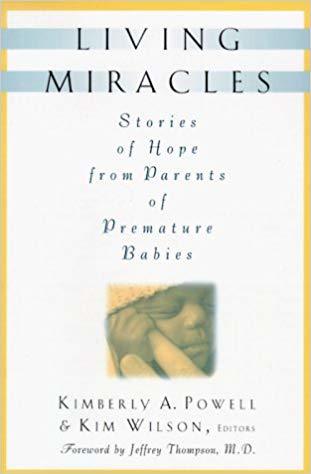 A guide for parents of premature babies discusses the experiences of the parents of twenty premature babies and the stories of their ordeals, as well as providing tips on dealing with feelings of anger and depression. 10,000 first printing.
A guide for parents of premature babies discusses the experiences of the parents of twenty premature babies and the stories of their ordeals, as well as providing tips on dealing with feelings of anger and depression. 10,000 first printing.Find Bert on Facebook, Twitter and Instagram Where to Buy Living Miracles Amazon
Published on August 20, 2018 05:00
August 13, 2018
#WhatsYourStory Featuring Phyllis Irene Radford
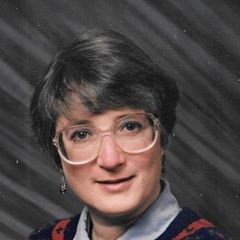 Irene Radford has been writing stories ever since she figured out what a pencil was for. Editing grew out of her love of the craft of writing.
Irene Radford has been writing stories ever since she figured out what a pencil was for. Editing grew out of her love of the craft of writing.Mostly Irene writes fantasy and historical fantasy including the best-selling Dragon Nimbus Series and the masterwork Merlin’s Descendants series. In other lifetimes she writes urban fantasy as P.R. Frost or Phyllis Ames, and space opera as C.F. Bentley. Lately she ventured into Steampunk as Julia Verne St. John.
If you wish information on the latest releases from Ms Radford, under any of her pen names, you can subscribe to her newsletter: www.ireneradford.net. Or you can follow her on Facebook as Phyllis Irene Radford, or on twitter @radford_irene25
You can also read advance copies of new books on Irene’s Patreon Account: https://www.patreon.com/user?u=5806073
Reading a book imbued with spirituality and later trying to write those qualities into my own work has fascinated me for a long time. Spirituality is more than religion. To me it is a spiritual character, someone who lives their faith and has a personal relationship with their beliefs. Their faith guides every decision they make even when they question the advisability of the decision.
For them there is no division between the divine and reality.
I played with these ideas in Guardian of the Vision, Merlin’s Descendants #3. https://bookviewcafe.com/bookstore/book/guardian-of-the-vision/
Griffin Kirkwood is a Roman Catholic priest who must wrestle with the strict teaching of his religion, weighing those truths against the truth of Magical talents in himself and his family. “A spell is nothing more than a prayer.”
I started to see that faith is more than emotion, but it needs to invoke and emotional response from the reader. That is hard to do but begins on a character level. The writer, and the reader needs to bond closely to the character and understand what they believe and why.
Then came the Confederated of Star System series by C.F. Bentley. https://bookviewcafe.com/bookstore/book/harmony/
Sissy dove head first into my life and would not go away until I told her story. An undereducated factory worker, our heroine found herself dragged into the Temple Caste and made High Priestess because the powers that be thought she’d be malleable and do as she was told. They learned otherwise. But finally given the right and the means to read the history of Harmony, both goddess and planet, she has questions that she cannot reconcile with her very direct and magical connection to her home and her faith. No one messes with the avatar of a goddess, even when she is forced into exile on a space station.
That series exhausted me, and I went back to more mundane topics. Until…
My best friend and co-writer, Bob Brown, came up with a new anthology idea. We’d already co-edited and written for Alternative Truths, which hit several Amazon bestseller lists, and More Alternative Truths. He published a couple of other books without me while I wrote a couple books on my own. But then I got a phone call. “Want to edit Alternative Theologies?”
https://www.amazon.com/Alternative-Theologies-Parables-Modern-Alternatives-ebook/dp/
How could I say no?
We racked up almost 150 submissions. In every open call anthologies there a few inappropriate pieces. Some in the “What were you thinking?” category that make me head for the hand sanitizers. There are a few that are beautifully written pieces that don’t quite fit theme. We bought two of those for the next anthology “Alternative Apocalypses.”
And then there is the good stuff. The really good stuff that made us cry when we had to choose one from among four with similar themes.
In reading the stories I had to sit up and take notice, then I had to think. Think about my own beliefs, think about how the authors presented themes, think about the readers who would also think, even if they ended up throwing the entire collection against the wall. I thought about the stories when they made me laugh, or made me cry, or made my heart swell with new faith and affirmation.
This collection does not bash or denounce religion. It does rail against those who pervert the teaching of their faith. It examines why we believe, crave believing in something bigger and grander than ourselves. And it gives me new foundations for my own beliefs.
Believe what you will, in the deity who speaks to you. And I hope you can read these stories and think.
Committing Novel
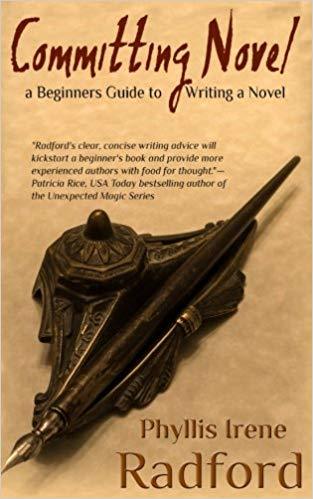 People have great book ideas. Yet despite their best efforts, they find it nearly impossible to complete a single chapter. All too soon they give up, disheartened. In this slender, easy-to-use volume, Phyllis Irene Radford--author of over forty books, and editor of twenty-five books, and fifteen anthologies—gently guides writers through plot structure, realistic characters, dynamic writing, organizational tools, and the publishing industry from an insider’s point of view. So, if you’ve ever thought about writing a novel, this book can help you create a dynamic beginning, conquer the muddle in the middle, and write a powerful and satisfying ending with an experienced teacher holding your hand and giving examples.
People have great book ideas. Yet despite their best efforts, they find it nearly impossible to complete a single chapter. All too soon they give up, disheartened. In this slender, easy-to-use volume, Phyllis Irene Radford--author of over forty books, and editor of twenty-five books, and fifteen anthologies—gently guides writers through plot structure, realistic characters, dynamic writing, organizational tools, and the publishing industry from an insider’s point of view. So, if you’ve ever thought about writing a novel, this book can help you create a dynamic beginning, conquer the muddle in the middle, and write a powerful and satisfying ending with an experienced teacher holding your hand and giving examples.Find Phyllis on Facebook:
www.facebook.com/phyllis.i.radford
Where to Buy Committing a Novel Amazon
Published on August 13, 2018 18:39
August 6, 2018
#WhatsYourStory Featuring Jodi Bowsersox
 Jodi Bowersox has worn many hats in her life--actress, seamstress, designer, business owner, homeschool teacher, kid's choir director, and artist--but she spends most of her time these days on her latest passion, romance novels.
Jodi Bowersox has worn many hats in her life--actress, seamstress, designer, business owner, homeschool teacher, kid's choir director, and artist--but she spends most of her time these days on her latest passion, romance novels. As an award winning watercolor artist , Jodi specializes in pet portraits, and as a seamstress, she creates women's vests out of men's ties. You can view all her creative endeavors as well as read samples of her books at www.jodibowersox.com.
Jodi lives in the heart of Colorado Springs with her husband and too many cats where they never get tired of looking at the mountain views
I've have been a writer all my life from 4-H news reporting through bad Jr. High poetry to slightly better college poetry to plays, skits, children's programs, children's picture books, and finally, full length fiction.
It was my mother (a long time Romance reader) who encouraged me to try writing that first Romance in 2011. I had a glimmer of an idea, put my fingers to the keyboard, and I was off. It has been my obsession ever since, and I am currently in the middle of my twelfth novel.
What I write would mostly fall in the Romance category, but I'm not one who likes getting put in a box. I have books in Suspense, Faith Fiction, Time Travel, and Small Town categories, and my Work In Progress is a Sci Fi Rom Com.
I have found inspiration for storylines in many places. Several of my books were sparked by a real event in my life---a perturbing incident, a horse accident, and a ride up Pikes Peak in a thunder storm (Interiors By Design; Horses, Adrenaline, and Love; and JOLT). And some were just dropped out of the sky as something I felt the need to write (Rocky Mountain Series). And that Sci Fi Rom Com? Rocky Mountain Redemption has a character who is an author, and Mars Madness is one of the books I attributed to her. I just thought it would be fun to write her books...
The lesson I've learned is patience. You will not be a successful author overnight. (Or at least it is highly unlikely.) Just keep writing. Write what you love, and try not to worry about those that don't appreciate what you do.
If I have any advice for aspiring writers, it's to find that person who will tell you the truth about your book... before your reviewers do. Then be willing to make changes.
Some of my favorite authors are Lois McMaster Bujold (sci fi/fantasy), Tamara Leigh (historical romance), Barbara Nickless (suspense), Marianna Jameson (contemporary romance), J.K. Rowling (fantasy), and Douglas Adams (sci fi comedy).
I'd love to meet any of these people (all those who are still alive, anyway!) just to tell them how much I appreciate their attention to detail, their amazing characters, their consistency in writing good books over and over and for all the laughs, tears, and joy they've brought to my life.
Jive: An American Time-Travel Romance (Lightning Riders Book 3)
 Time agent Jewel Jamison promised a young Jack Cavanaugh that she'd be his 26th birthday present. She'd hoped for a fling with the man she'd become obsessed with in the history books, but Jack, having waited ten years for the sexy Jewel to show up in 1919, has plans to build a life together.
Time agent Jewel Jamison promised a young Jack Cavanaugh that she'd be his 26th birthday present. She'd hoped for a fling with the man she'd become obsessed with in the history books, but Jack, having waited ten years for the sexy Jewel to show up in 1919, has plans to build a life together. Before they can even begin to explore the possibilities, however, Jewel realizes that the timeline is now missing something -- namely World War I. A full-scale "time crisis" is raging as two factions battle through history--one trying to erase war and the other trying to erase time travel and all traces of it. Including traces like Jack Cavanaugh.
As the "Time War" rages, Jewel has to choose: keep her promise to Jack and stay out of the war or break her promise in order to save him.
Where to Buy Jive Amazon
Published on August 06, 2018 05:00
July 30, 2018
#WhatsYourStory Featuring Nick Armstrong
 Nick Armstrong is the Geek-in-Chief behind WTF Marketing, dad, author, Ignite, PechaKucha, Startup Week, and TEDx speaker, audio drama enthusiast, and award-winning entrepreneur.
Nick Armstrong is the Geek-in-Chief behind WTF Marketing, dad, author, Ignite, PechaKucha, Startup Week, and TEDx speaker, audio drama enthusiast, and award-winning entrepreneur.
More than anything, he loves to make people laugh.
He has co-organized community events like Fort Collins Comic Con, Startup Week Fort Collins, TEDxFoCo, Ignite Fort Collins, LaidOffCamp/CareerCamp, PodCamp Fort Collins, and more.
Nick’s local efforts landed him a prestigious spot as one of BizWest's 40 Under Forty in 2016 and the Colorado Association of Libraries’ Library Community Partnership Award in 2018.
Alongside an amazing team of 13 other super-geeks, he built out Fort Collins Comic Con to benefit the Poudre River Public Library District and has raised over $75,000 for the Library to encourage youth literacy through comics.
Nick has written three books: Psychotic Resumes, a Gen-Y resume creation and job search guide, Mess Hunter, a children's book that he also illustrated, and a cookbook called Men in Kitchens: A Good Day to Dine Hard. Nick’s marketing writing has also appeared in anthologies alongside business and marketing greats such as Seth Godin, Ash Ambirge, and Leo Babauta.
In general, I knew literally nothing about how to finish most of my writing projects when I started.
My first “published” work was a Star Trek audio drama - think old-school radio plays like The Shadow with actors and sound effects and music.
I had no idea how to write the audio drama format and even less about how to produce one. Little by little, with lots of help from the online audio drama community, I had my first script, and then a library of sound effects and some music, and a friend who helped connect me to volunteer voice actors.
If you’ve never had someone lend a voice to one of your characters, I highly recommend it - it’s one of the most amazing experiences I think any writer can have.
Like self-publishing, there are a LOT of things to learn in the production of audio drama - timing, where to place sound effects, how to balance volumes of different clips... the learning curve was extensive, but learning how to stay dedicated to a project over weeks and months was hugely important to my future success in traditional publishing.
Around the 2-year-span before and after the height of the Great Recession, I had 12 jobs and was only fired 3 times. My friends were in awe of my ability to land job after job after job with the longest gap being about 3 months (when the average job search length at the time was 12-16 months).
All the while, I started my blog Psychotic Resumes about things at each job that were either spectacular or something I wouldn’t inflict on my worst enemy - like the time I was written up for being “overly direct” about a solution that would save the company about $150K in overhead costs.
I was sitting on all this excellent content - people continued to comment on my blog even after I’d slowed down regular blogging to focus on starting my own business. In a fit of kismet, one of the graphic designers I regularly worked with asked if I knew anyone who was looking to create a Kindle book. We didn’t have much of an idea of what would be involved, but we dove in and gave it a shot. I’d write, tweak, and modify blogs into chapters and she’d do the design work.
A few months later, I had my first published book - Psychotic Resumes. I sold maybe 15 copies total and learned a significant publishing lesson: create in as many different formats as possible. My book was only available in Kindle format, and not many people had a Kindle - especially folks looking for a job. There was no easy or cost-effective way to self-publish (CreateSpace wasn’t widely available yet), and so most people passed on my book.
I put most non-blog writing on hold for a while after that. Not that I didn’t want to write, but between a new wife and growing business, there wasn’t time for much else. Adding “new father” to my title didn’t help either until we were about six months into reading piles and piles of children’s books to our son.
My wife and I read quite a few beautiful books but just as many head-scratchers (we’re prolific library patrons). It wasn’t until my artist friend created his own CreateSpace children’s book that I realized that I could write a children’s book, too. He was kind enough to help me figure out the basics of the process over the course of a coffee meeting.
I wrote out the basic storyline and decided to illustrate it myself. I’d priced out a few graphic designers to help, but the lowest at $700 for 20-ish pages didn’t seem like a wise use of money with a new kiddo in tow. Diapers are expensive, after all!
Looking back, I was supremely naive when it comes to how much work this would actually take. I learned basic character design by using Lynda, Skillshare, and 53’s Paper app, but creating every page’s illustration from scratch was hugely time-consuming. This was made worse by the fact that I hadn’t properly confirmed page sizes or minimum page count in CreateSpace before I started illustrating (the technical term for this is “whoops”).
After drawing a few more pages and segmenting the story to get to the proper minimum number of pages, I had to learn how to work InDesign - again by using Skillshare and Lynda (surprisingly enough, this was the easiest part of the whole process).
A month or so later, I had my proof in-hand. After nearly a whole year of reading other people’s books to my kiddo, I showed him a picture of himself in my book. His giggle when I said, “written and illustrated BY DADDY” was incredibly rewarding.
Even better, the skills I learned while digging into Illustrator, InDesign, and CreateSpace allowed me to apply those same skills to help my clients in my day job.
Though it took a LOT longer, learning to DIY each part that I could has helped me gain a ton of valuable skills (I even put together my friend’s first book). While the DIY-all-the-things approach isn’t for everybody, for me, it opened up the creative process to so many more applications and reduced costs significantly - allowing me to take more risks on my creative projects.
My future projects will involve science fiction - some of my favorite reads are the Magic 2.0 series by Scott Meyer, anything by Becky Chambers, and Year Zero by Rob Reid (who I’ve had the chance to meet and high-five for his fantastic work).
Psychotic Resumes
 To get the attention necessary to become gainfully employed in a double-dip recession job market with 9%(+!) unemployment, you absolutely have to stick out - in a good way.
To get the attention necessary to become gainfully employed in a double-dip recession job market with 9%(+!) unemployment, you absolutely have to stick out - in a good way.Honest, risky, and effective, Psychotic Resumes is the kind of advice you won’t find anywhere else. Written by Nick Armstrong, the co-founder of LaidOffCamp Fort Collins and CareerCamp Fort Collins, this isn't your typical "resume" book.
Nick's off-the-cuff sense of humor, keen mastery of four letter words, and unique look on today's job market will have you entertained, horrified, and inspired all at once.
Do you get the feeling that today's job market rules have changed, but nobody's given you the new playbook? Have you ever seen a job search technique so crazy that you're amazed it worked? Are you frustrated by your seemingly unending job search and willing to try something - anything - to land a job before you resort to a ramen-only diet?
Enter Psychotic Resumes: all the advice you never knew, but really needed to land a better job for better pay.
You’ll learn how to conduct an effective job search, write better, cleaner resumes, build amazing cover letters, ace your job interviews, negotiate your salary like a rockstar, and organize your business life so you impress on your first week at your new job.
Specifically targeted toward Gen-Y (the Millennial Generation), the advice in this book has been field tested for years, proven effective across career paths and geographies to get unemployed college grad butts off mom and dad's couch. Gen-Y doesn't get all the fun, though - Baby Boomers and Gen-X will find a lot of use from the advice in this book, too.
It’s time to stop flipping burgers and start doing meaningful work again! Where to Buy Psychotic Resumes Amazon
Published on July 30, 2018 05:00
July 23, 2018
#Thrillerfest18 Recap & Adventures in NYC
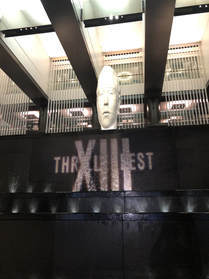 It’s been a week since Thrillerfest 2018 ended and I came back to my home in Boulder, CO, full to the brim with ideas and inspiration. If I had to choose the one thing that I love most about Thrillerfest, it would be the collegial spirit. Thrillerfest is like the coolest writing conference and an awesome Con mixed together, featuring some of the top names in the genre who enthusiastically shower us with their knowledge and experience. Very few places give me the chance to me a serious writer and a serious fan-girl all in one place. It’s magic.
It’s been a week since Thrillerfest 2018 ended and I came back to my home in Boulder, CO, full to the brim with ideas and inspiration. If I had to choose the one thing that I love most about Thrillerfest, it would be the collegial spirit. Thrillerfest is like the coolest writing conference and an awesome Con mixed together, featuring some of the top names in the genre who enthusiastically shower us with their knowledge and experience. Very few places give me the chance to me a serious writer and a serious fan-girl all in one place. It’s magic.Some highlights then…
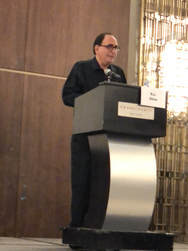 R.L. Stine @ #Thrillerfest18 On the first day of Craftfest, R.L. Stine gave a talk called “All My Writing Secrets Revealed” so….I mean, obviously I had to go, yes? I write for adults, but I mean, come on. It’s R.L. Stine! I grew up alternating between Stine and Christopher Pike (who played an important, if indirect, role in Stine’s move from humor to horror). Now, my kids read Goosebumps. R.L. Stine is a delightful person. The talk he gave was bursting with the joy of writing and it was contagious. I can’t imagine anyone sitting in that audience without wanting to get back to the keyboard. Later, he signed some copies of his latest Goosebumpsbooks for my kids. My son was amazed that his name was spelled right without me having to help J I also enjoyed two very different presentations by two very awesome Megs. Last year, when I was reading Megan Abbott’s book You Will Know Me, my daughter was in gymnastics and it actually gave me nightmares. Megan is a sweet, funny, and enthusiastic presenter. She gave some wonderful examples about setting the mood when writing thrillers and I’ve already started applying those lessons to my manuscript. Then, there’s Meg Gardiner, whose class on creating suspense was full of valuable takeaways. These women are charming, articulate, and interesting, making for a very happy me.
R.L. Stine @ #Thrillerfest18 On the first day of Craftfest, R.L. Stine gave a talk called “All My Writing Secrets Revealed” so….I mean, obviously I had to go, yes? I write for adults, but I mean, come on. It’s R.L. Stine! I grew up alternating between Stine and Christopher Pike (who played an important, if indirect, role in Stine’s move from humor to horror). Now, my kids read Goosebumps. R.L. Stine is a delightful person. The talk he gave was bursting with the joy of writing and it was contagious. I can’t imagine anyone sitting in that audience without wanting to get back to the keyboard. Later, he signed some copies of his latest Goosebumpsbooks for my kids. My son was amazed that his name was spelled right without me having to help J I also enjoyed two very different presentations by two very awesome Megs. Last year, when I was reading Megan Abbott’s book You Will Know Me, my daughter was in gymnastics and it actually gave me nightmares. Megan is a sweet, funny, and enthusiastic presenter. She gave some wonderful examples about setting the mood when writing thrillers and I’ve already started applying those lessons to my manuscript. Then, there’s Meg Gardiner, whose class on creating suspense was full of valuable takeaways. These women are charming, articulate, and interesting, making for a very happy me.  Megan Abbott @ #Thrillerfest18
Megan Abbott @ #Thrillerfest18  Meg Gardiner @ #Thrillerfest18
Meg Gardiner @ #Thrillerfest18
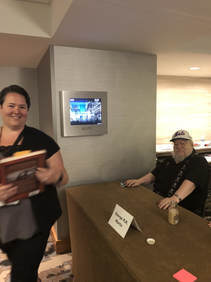 Me and George R. R. Martin @ #Thrillerfest18 Oh, and Megan Miranda made my day! We met last year, and when I asked her to sign my book this year, she remembered me J(yep, fan-girl). Her new book Fragments of the Lostlooks amazing! I love meeting authors I’ve been reading for years, and also being introduced to new authors who I’ll be reading for years to come. In a panel on creating suspense, Gin Phillips talked about motherhood and how some of the routine things we do create the perfect atmosphere for suspense—in her case, going to the zoo. Can’t wait to open up Fierce Kingdom.
Me and George R. R. Martin @ #Thrillerfest18 Oh, and Megan Miranda made my day! We met last year, and when I asked her to sign my book this year, she remembered me J(yep, fan-girl). Her new book Fragments of the Lostlooks amazing! I love meeting authors I’ve been reading for years, and also being introduced to new authors who I’ll be reading for years to come. In a panel on creating suspense, Gin Phillips talked about motherhood and how some of the routine things we do create the perfect atmosphere for suspense—in her case, going to the zoo. Can’t wait to open up Fierce Kingdom. And who can forget the moment when the lights when off on George R. R. Martin? I’ve been hoping to meet that guy for almost a decade, and it was thrilling to do so. We chatted about New Mexico (where he lives and where I’m from). I love how genuine and accessible even the biggest stars of the conference are—its always a pleasure meeting them and they always make you feel like you belong.
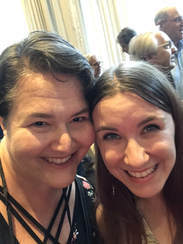 Me and Chloe Hawker I got to hang out with old friends like Chloe Hawker, make new friends like TJ Turner, and met long-distance friends like Joe Clifford in person. I left the Big Apple with some amazing opportunities and some wonderful memories. Can’t wait until next year!
Me and Chloe Hawker I got to hang out with old friends like Chloe Hawker, make new friends like TJ Turner, and met long-distance friends like Joe Clifford in person. I left the Big Apple with some amazing opportunities and some wonderful memories. Can’t wait until next year!For the second year, my cousin Rachel joined me in NYC. We went to see the fashion exhibit at The Met, and took a tour of the Senses exhibit at the Natural History Museum. We rode the subway around town, walked Central Park and enjoyed delicious food and stunning views at Print (if you haven’t been, check out the rooftop bar). Rachel is one of my very favorite travel partners. She introduces me to high fashion and I regale her with stories of murder and mayhem. It’s a fair trade.




Published on July 23, 2018 14:41
July 15, 2018
#WhatsYourStory Featuring David Sharp
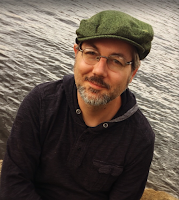 David Sharp is a noisy librarian. He has written three plays which have been produced six time altogether. He is a regular contributor to The Writing Bug, and he has written a novel for which he is seeking representation as well as numerous short works. Lost on a Page Life can be hard on a writing schedule.
David Sharp is a noisy librarian. He has written three plays which have been produced six time altogether. He is a regular contributor to The Writing Bug, and he has written a novel for which he is seeking representation as well as numerous short works. Lost on a Page Life can be hard on a writing schedule.I was in the middle of an unplanned move. My split-level apartment had become flooded during a sudden afternoon deluge. The result wasn't pretty, and it ended with my landlord and I renegotiating my move-out date. My car had only two working doors, and the money I'd been saving to replace it was now going toward a new place to live.
I'd been transferring boxes to the new place and pining for a truck with a trailer. I needed to take a break. So, I stopped into a nearby coffee shop. I was basked in the cool air conditioning and tried to forget I still had a full afternoon of heavy-lifting ahead of me.
My phone pinged.
An email.
From a publisher.
They wanted to "offer me a contract" for the manuscript I had submitted to them.
Confused, I reread the email several times. This was a foreign sort of missive for me. It resembled a rejection. Now those I had experience with. Polite opening. Formal language. It thanked me for my submission. But instead of telling me the piece was not right for them at this time and wishing me luck with my future endeavors, it seemed to be saying they'd like to publish my novel.
If this were a fictional story, this is the part where the writer would begin shouting for joy, his present hardships forgotten, and making such a scene that all the coffee shop patrons would stare at him like he'd lost his mind.
That's not how it really happened, though. My emotions were already so strained working through my current struggles (of which the move was only the latest development) that they just couldn't seem to fathom what was happening. I felt like I had blown a fuse.
Unwilling to trust my own comprehension, I did what any self-respecting writer would do. I forwarded the email to my critique group and asked them to tell me what they thought it meant.
Was this a different language or something? Perhaps the word "contract" in this email was the publisher's polite way of telling me I had come down with malaria. Because, of course they couldn't mean the kind you sign.
The truth is, you develop such a thick skin for rejections in this business it takes a while for elation to sink through it. (It did eventually, though. And I had a nice, dry apartment to celebrate in.)
None of this is how I'd imagined the fateful day I'd finally hook a publisher. The dream I constructed in my head had nothing to do with heavy boxes, flooded carpets or a car on its last tires. But I shouldn't have been surprised. None of the other steps in this journey happened the way I pictured them either. And lucky for me, they didn't.
My writing journey didn't happen in a vacuum. It was interwoven with life events and all their ups and downs. It was informed by them.
I'm a single parent of two children, one of whom has some special considerations. I'm a full-time librarian. It's a lot more work than you might imagine. (And no. I don't get to read books all day.) I complain from time to time that it is difficult to find time to write. It is! By the time I make dinner, help with homework, spend time being a parent and put the kids to bed, the last thing I want to do is boot my computer up.
But I've come to learn that only the last part of writing involves putting words on the page. It's all that other madness that gives me words to begin with
It's all writing.
I can now hold my own bound book in my hands. It has accrued several stars on Amazon. And now that I've "arrived" (whatever that means) my journey contains as many twists and turns as it ever has. Life hasn't let up since my book published in May, and I suppose that's a good thing. I have a sequel to write after all.
It's tricky to find a spare moment sometimes, but I'm never short on inspiration! In fact, I should probably cut this short, because I hear my children producing some inspiration right now. And by the sound of it, this is going to be on the epiphany level. The last time involved an intricate contraption of Lego blocks and duct tape and they...
Well, another time! It'll be a chapter somewhere; just watch for it
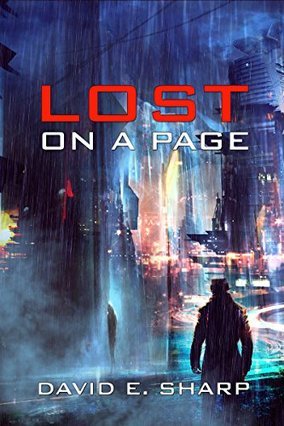 Joe Slade is a detective with a hot lead and a warm gun. He no longer believes in happy-ever-afters, but the jury's still out on plot twists. Good thing. He's about to discover the mother of all twists that will cure his doldrums like pliers to a toothache: Joe Slade is not real. He's the protagonist of a series of hardboiled mysteries. And when Joe finds out that all his strife has been in the name of boosting book sales, there will be hell to pay.
Joe Slade is a detective with a hot lead and a warm gun. He no longer believes in happy-ever-afters, but the jury's still out on plot twists. Good thing. He's about to discover the mother of all twists that will cure his doldrums like pliers to a toothache: Joe Slade is not real. He's the protagonist of a series of hardboiled mysteries. And when Joe finds out that all his strife has been in the name of boosting book sales, there will be hell to pay.Vowing revenge on his author, he will band with the mysterious Ellodrine, a high fantasy wizard who suffers from reinterpretation. Together, they will set off for the World Where the Books Are Written. But the road will take them through new books with genres strange and foreign; epic fantasy, bodice-ripping romance, intergalactic sci-fi, and others even more dark and horrible. But what if this new life is about more than just living? And will Joe still come out on top when all the rules have changed? Where to Buy Lost on a Page Amazon
Published on July 15, 2018 16:44
July 9, 2018
#WhatsYourStory Featuring Brian Kaufman
 Brian Kaufman is curriculum editor for an online junior college. He has published four novels, two textbooks and a number of novellas. In other universes, he is a pro wrestler, a radio talk show host and a heavy metal guitarist. In this universe, he lives with his wife and dog in the Colorado mountains, avoiding moderation and any pretense of maturity. My love of books grew out of weekly trips to the library with my father. The local library proved to be too small, so every Monday night, we made the hour drive to the Cleveland Public Library, a huge old building with multiple floors and wings. There, I found vast, unattended areas stuffed full of books written by dead people. Quiet, shadowy aisles full of Poe, Lovecraft and Shelly made me a lifetime fan of dark fiction.
Brian Kaufman is curriculum editor for an online junior college. He has published four novels, two textbooks and a number of novellas. In other universes, he is a pro wrestler, a radio talk show host and a heavy metal guitarist. In this universe, he lives with his wife and dog in the Colorado mountains, avoiding moderation and any pretense of maturity. My love of books grew out of weekly trips to the library with my father. The local library proved to be too small, so every Monday night, we made the hour drive to the Cleveland Public Library, a huge old building with multiple floors and wings. There, I found vast, unattended areas stuffed full of books written by dead people. Quiet, shadowy aisles full of Poe, Lovecraft and Shelly made me a lifetime fan of dark fiction.When people talk about the feel and smell of a real book, I think of that library and the odors of leather, mildew and dust. And I think of the quiet.
My goal was to read seven books a week. I kept pace for years, until baseball practice began cutting into reading time. (Dad helped with baseball, too. We played catch after dinner every night, weather be damned. I didn’t learn how little he cared for the sport until years later.)
Baseball aside, I don’t think I’ve ever gone a week without reading at least one book. Back then, I read everything. I gravitated toward age-inappropriate material. My father borrowed our books on his library card, so he knew what I was reading. Much to my relief, he never commented on my choices beyond suggesting additional titles.
When I was twelve, I announced my intention to earn my living in professional sports. My father suggested that I might need a backup plan, so I began writing. If not center fielder for the Yankees, then a best-selling author, right? Later, when I married and the need for a backup plan became more immediate, he explained that writing for a living was like “winning the lottery.” He suggested ways to pursue a dream in my spare time, beginning with the need to make spare time available. I had a craft to learn, and a million words to write.
Through the administrations of eleven different Presidents, I’ve learned a few things more:
Persist. My first published novel (The Breach, Last Knight Publishing) earned 103 rejections slips before seeing print.
Don’t Stop Learning. When my dream stalled out, I quit my job and earned a degree in literature from Colorado State, graduating at the age of 47. That was just the start.
Meet other Authors. I belong to two critique groups. I correspond with dozens of writers via email. I attend book signings. My favorite signing featured author and filmmaker Clive Barker. He was rock-star cool, and he shared my love of Tab, a vaguely cola-like diet beverage. Watching him slam can after can somehow convinced me that I, too, could become an author.
Be a Businessperson. When I got that impossible “lottery ticket” writing job (I write and edit textbooks), I learned that writing doesn’t happen when the muse strikes—it happens when you plant your butt in a chair.
Read and Write Outside Your Comfort Zone. Much of my writing reflects the dark nights in the Cleveland library, but there’s much to be said for stretching. I’ve written poetry and accounting texts. Historical fiction and tales of the zombie apocalypse.
This last piece of advice informed my most recent efforts. My parents suffered eventual health setbacks that convinced me of my own mortality. Mom passed last year, and Dad followed her shortly thereafter. Having carried some “bucket list books” in the back of my head for decades, I decided to tackle the stories I’d always meant to tell, but somehow put off. I started with The Fat Lady’s Low, Sad Song—a tale about baseball, the passion for a fading dream, and saying goodbye to the people and things you love. The Fat Lady's Low, Sad Song
 Courtney Morgan is a female knuckle-ball pitcher trying to break into professional baseball. Parker Westfall is an aging slugger with one last chance at the ultimate carrot—a spot on a major-league roster. She’s gorgeous, and he’s having the season of his life. Together, they’ll try to change a losing team’s fortunes on their way to the big show. But when tragedy strikes, will their dreams still matter? The Fat Lady’s Low, Sad Song is about what it means to be part of a team, and part of a community in the heartbreaking world of minor league ball.
Courtney Morgan is a female knuckle-ball pitcher trying to break into professional baseball. Parker Westfall is an aging slugger with one last chance at the ultimate carrot—a spot on a major-league roster. She’s gorgeous, and he’s having the season of his life. Together, they’ll try to change a losing team’s fortunes on their way to the big show. But when tragedy strikes, will their dreams still matter? The Fat Lady’s Low, Sad Song is about what it means to be part of a team, and part of a community in the heartbreaking world of minor league ball."An entertaining, sweetly atmospheric baseball story."
~Kirkus Reviews
Like Brian's page on Facebook
Follow Brian on Amazon
Check out Brian's blog
Follow Brian on Goodreads Where to Buy The Fat Lady's Low, Sad Song Amazon
Published on July 09, 2018 05:00
July 3, 2018
Destination #Thrillerfest2018 & Musings of the Star Struck
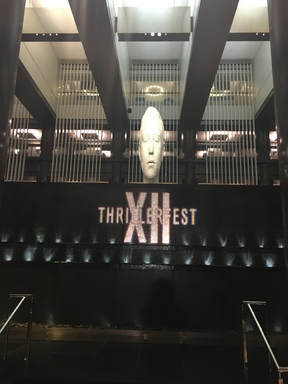 The entrance at the Grand Hyatt for Thrillerfest 2017
The entrance at the Grand Hyatt for Thrillerfest 2017 About a week before conference time, I start getting a little bit nostalgic. During NCW, I spent hours reminiscing over previous years programs and all the shenanigans I enjoyed. Now it’s time for Thrillerfest and I’m strolling down memory lane. This is my second year. When I decided to change direction with my writing, I started looking for craft and community opportunities. I ran across the International Thriller Writers Organization and, as a result, got introduced to Thrillerfest. The organization was founded by some of my favorite thriller authors…names you see on the best seller shelves at every bookstore you visit. And the prospect of being in the same room with some of those people was daunting to say the least. I’d finished my first thriller manuscript, but I wasn’t ready to pitch yet. What I knew though, without a doubt, was that I needed to be with people doing the same thing I was doing.
Now, I’m not going to lie. I am a completely over-the-top fan girl when it comes to authors. As a library volunteer in New Mexico, some of my best memories include authors like Michael McGarrity, Denise Chavez and Hampton Sides. I’d discovered that George R. R. Martin lived in Santa Fe and I was scheming on ways to entice him down to my hometown when Game of Thrones hit HBO and I figured I’d lost my chance to meet him (keep that in mind, it becomes relevant in a few paragraphs). Last year at Thrillerfest, Lisa Gardner (who is one of my very very very favorite thriller authors) was receiving the Silver Bullet award and, at one point, being interviewed by Karin Slaughter (another favorite). I nearly died of a heart attack before I even got there! No chance of keeping my cool. As a thriller fan, meeting Gardner and Slaughter, as well as Lee Child, David Morrell, Lisa Jackson, R.L. Stine, Megan Miranda, Shari Lapena and so many others was magic!
I adore New York City. As a visually impaired person, big cities offer freedom that you just can’t find in small town America. Arriving at the hotel, I settled in and tried to put on my game face. I’d volunteered to room monitor for a few sessions as a way of getting past my nerves. That’s how I met Sam Wiebe, who I’ve since come to adore and admire greatly. I took in a zillion pieces of new information (as you do at conferences) and met a lot of really great people. What was most amazing to me was how accessible the stars of the thriller genre are. I had casual conversations with people I’ve been reading for years (in some cases, decades). It’s hard to put to words how important that experience was for me.
So, I’ll be heading back to NYC again next week for Thrillerfest 2018! Woo hoo! And guess who this year’s Thrillermaster is? George R. R. Martin!!! A decade later, I’m going to get to meet another prolific author who I’ve read and loved and admired. So exciting! And I’m looking forward to connecting with the people I met last year, and writers I’ve had the honor to get to know online in the meantime. Who’s joining me?
Here are some pics from last year's conference and some sight-seeing with my cousin Rachel. We saw three shows during our stay. Waitress was definitely the best!
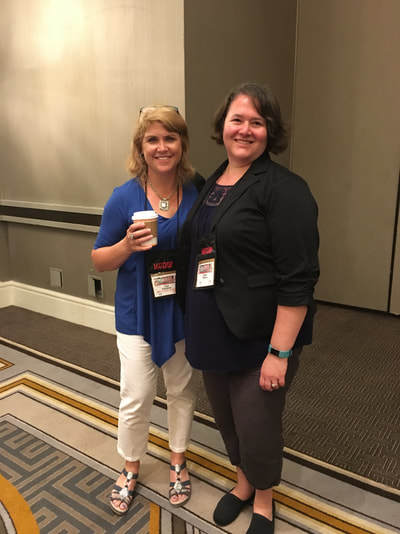

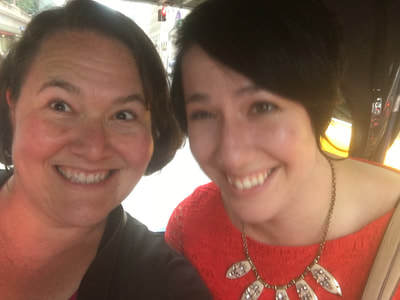
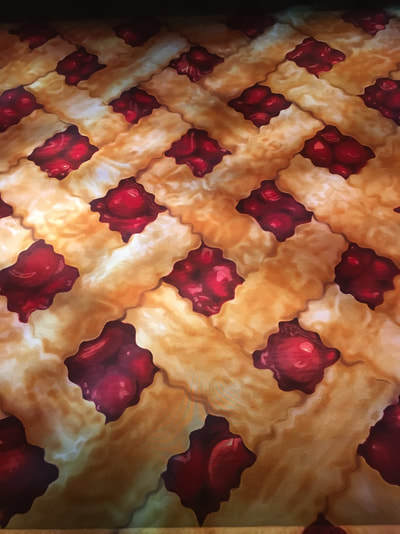
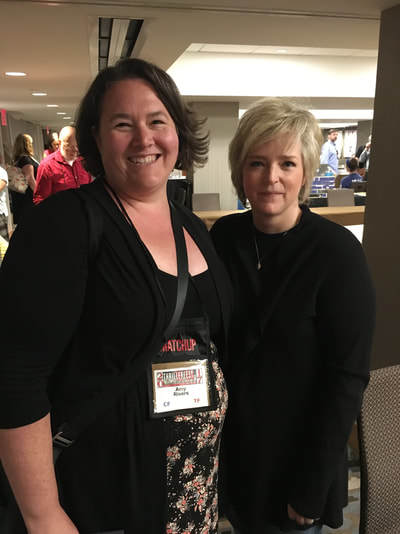
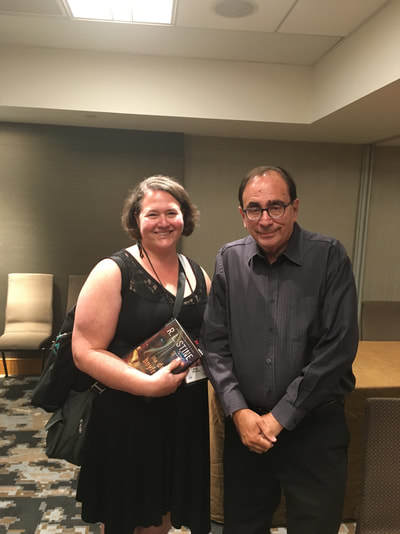
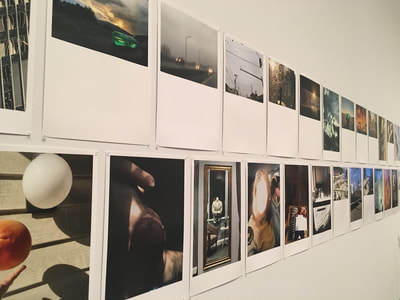
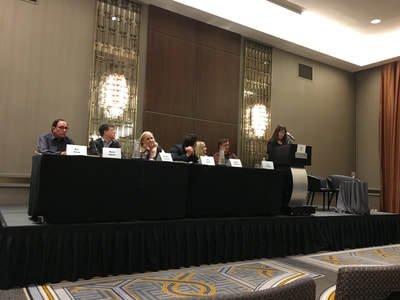
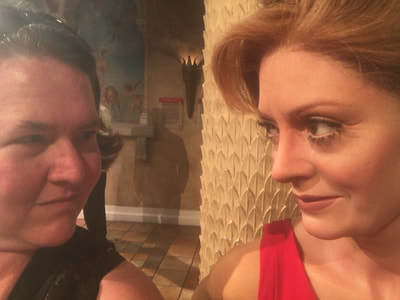
Published on July 03, 2018 06:00
July 2, 2018
#WhatsYourStory Featuring Brad Borkan
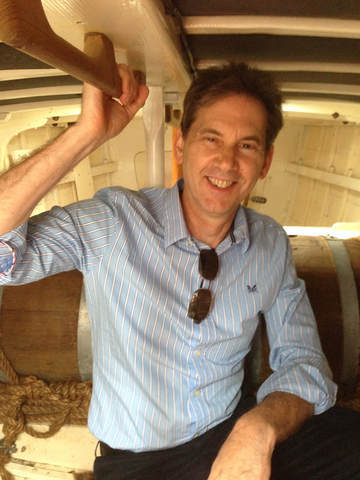 Brad Borkan has a graduate degree in Decision Sciences from the University of Pennsylvania and has a fascination in how people and businesses can make better decisions. He is based in London and was recently made a Fellow of the Royal Geographical Society. Antarctica – the early 1900’s – life and death decisions
Brad Borkan has a graduate degree in Decision Sciences from the University of Pennsylvania and has a fascination in how people and businesses can make better decisions. He is based in London and was recently made a Fellow of the Royal Geographical Society. Antarctica – the early 1900’s – life and death decisionsAmericans vividly remember where they were when 9/11 happened or, if older, when JFK was shot. I remember those events too. Another significant event I remember is where I was when I picked up my first book about the early Antarctic explorers. My mother volunteered part-time at the local public library, and at the age of 8, I would have to go there after school. It was quite boring until, by chance, I picked up a book about Captain Scott’s expeditions to the South Pole. I was hooked. Brave people doing dangerous things in the most inhospitable place on earth -- exciting stuff for an 8 yr old!
Over the years I read a few more books about these explorers, expeditions to other cold regions as well as books about mountain climbers. Cold, ice, snow, danger and mountains intrigued me. Early in my working life, I had the lucky experience to move to England for my job in software. I vaguely knew there were some Antarctic societies in the UK, but didn’t really pursue them until I discovered there was going to be a 100th anniversary conference commemorating Captain Scott in 2011. During the 3 hour train journey from London to Plymouth I was thinking this might be the dumbest thing I had ever done.
Through a stroke of luck I shared a taxi from the Plymouth train station to the hotel with two Antarctic experts who kindly introduced me to many people – descendants of the early explorers, historians, authors of books I adored, Antarctic experts, and modern-day explorers. All were incredibly friendly and welcoming.
Over the years I attended more Antarctic events and conferences and realized something is missing. There are lots of biographies of the great explorers like Scott, Shackleton, Amundsen and Mawson, and lots of accounts of their expeditions, but no one had looked across the 6 major expeditions made in the early 1900’s using the framework of the life-and-death decisions. I thought about this for several years, and decided what was possible was not just a book retelling these incredible stories, but one that could actually put the reader into their situations, and encourage the reader to think what they would have done. (e.g. would you leave a colleague dying of scurvy alone on the ice to save yourself, even if he asked you to). Also, I realized there are many great lessons to be learned from the early explorers that can help us today in our modern lives. We all hit patches of adversity, challenges and bad luck – the early explorers did too, and for the most part they survived. These lessons could help people today.
I had one other goal – the book had to be intelligent like a Malcolm Gladwell book, fast reading like a Dan Brown or John Grisham, and helpful like a Tony Robbins book. It also needed to be historically accurate. I knew I could not achieve this without a co-author who was both an experienced author and an Antarctic expert. Fortunately I met David Hirzel at an Antarctic conference in May 2015, and despite living 8 time zones apart, our collaboration began.
Fast forward to today. Two years in the making, the book I co-authored has surfaced. It is called When Your Life Depends on It: Extreme Decision Making Lessons from the Antarctic. The book was vetted for historical accuracy by seven of the world’s leading Antarctic historians (many of whom I met at the Captain Scott conference in Plymouth years before), and the cover was designed my one of London’s leading book designers. The book has been endorsed by Sir Ranulph Fiennes, the greatest modern Polar explorer of our lifetime. Jonathan Shackleton, a descendant of the explorer Ernest Shackleton has called it, “the Polar book of the year”.
I still live in England and work for a software company full-time. Writing the book has changed my life -- I now do book talks to business and non-business audiences and have appeared on cable TV and internet radio. My goal has always been to get the Antarctic stories into the common culture, and to hopefully show people that they can overcome challenges, adversity and bad luck just like the early explorers did.
Our website is www.extreme-decisions.com, and I am occasionally on twitter as @PolarDecisions. Our audiobook came out this month and was recorded by a world-renowned narrator, Dennis Kleinman. Dennis was so taken by the stories in the book that he made a 3 min video to help promote it.
The book was joy to write, and from it my co-author and I have developed a life-long friendship with the hope of collaborating on another book. When Your Life Depends on It: Extreme Decision Making Lessons from the Antarctic
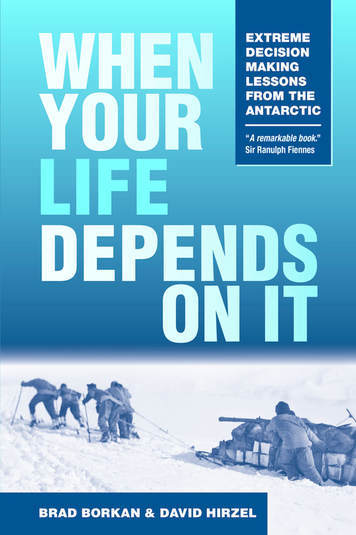 Antarctica -- Life-and-death decisions -- the early 1900's. The only communication is as far as you can shout.
Antarctica -- Life-and-death decisions -- the early 1900's. The only communication is as far as you can shout. How Scott, Shackleton, Amundsen and Mawson risked it all in their quest for the South Pole and beyond, and what we can learn from their situations to improve our modern-day decision making.
Grab a warm blanket. This book puts you right into the action of the life-and-death decisions made by early Antarctic explorers. It is filled with unforgettable stories about the challenges and decisions they faced on the ice.
While we might not be pulling sledges across Antarctica in the early 1900s, this book also reveals valuable lessons in leadership, team work, and sheer grit and determination that can help all of us make better decisions in our lives today.
In When Your Life Depends on It, you'll discover:
11 of the greatest survival stories in the history of explorationHow to make decisions fast without feelings of doubt or guiltHow to improve your team and leadership skills, which are valuable in any profession.When it is right to take a big risk.How to succeed against all odds
Co-written by a decision scientist and an Antarctic historian, When Your Life Depends on It is filled with tales of resilience that resonate with people who love travel and adventure as well as those seeking insights into human behavior. It reveals the mind-set of the brave men who risked, and in some cases gave their lives, for science, discovery and exploration.
Buy When Your Life Depends on It today to learn about one of the most remarkable periods of history and in the process learn new strategies to improve your own personal and business decision making.
Find Brad's website here
Find the 3 minute book trailer here
Find Brad on Twitter here
Where to Buy When Your Life Depends on It: Extreme Decision Making Lessons from the Antarctic Amazon
Published on July 02, 2018 05:00

